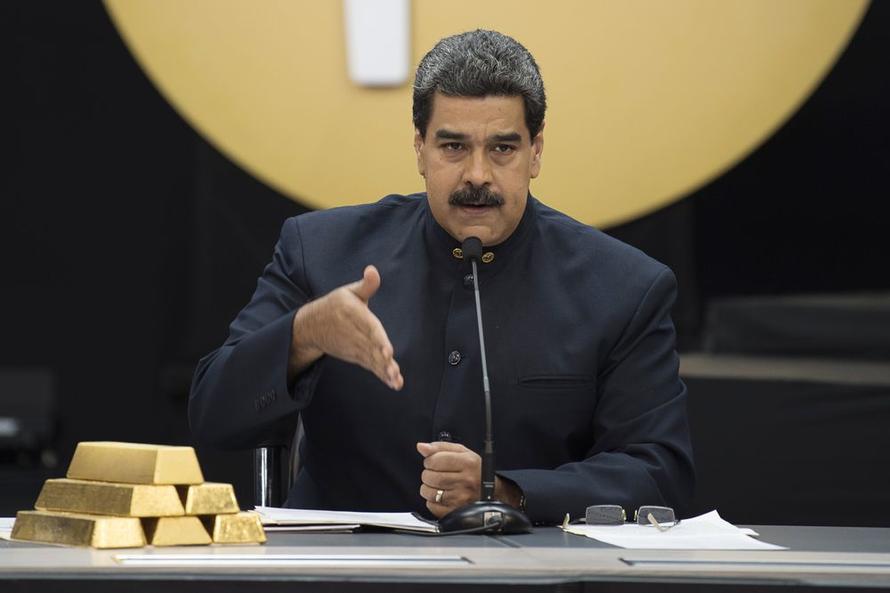 By Tyler Durden: The International Monetary Fund is reportedly making plans for the "day after" embattled President Nicolas Maduro's fall, according to Bloomberg. Though there's been little momentum in military defections following US-backed opposition leader Juan Guaido's offer of amnesty to any army officer that switches loyalties, Washington sanctions have effectively strangled state-owned PDVSA's access to global markets. News of IMF maneuvering also comes amidst fresh reports the US is amassing aircraft, troops and armored vehicles on the Venezuelan border under the pretext of getting humanitarian aid into the country.
By Tyler Durden: The International Monetary Fund is reportedly making plans for the "day after" embattled President Nicolas Maduro's fall, according to Bloomberg. Though there's been little momentum in military defections following US-backed opposition leader Juan Guaido's offer of amnesty to any army officer that switches loyalties, Washington sanctions have effectively strangled state-owned PDVSA's access to global markets. News of IMF maneuvering also comes amidst fresh reports the US is amassing aircraft, troops and armored vehicles on the Venezuelan border under the pretext of getting humanitarian aid into the country. The only significant cash flow that remains after the oil sanctions is through India, Venezuela’s second-biggest oil market after the United States, which still recognizes the Maduro government, and is now reportedly seeking to avoid purchases through US banks and even financial institutions with a heavy US presence. According to a Reuters report on Friday, "India has asked one buyer of Venezuelan oil to consider paying the South American nation’s national oil company PDVSA in a way that avoids the U.S. financial system, an Indian government source said, after Washington imposed fresh sanctions on Venezuela last month."
If oil buyers pay PDVSA through American institutions, US authorities can seize the funds. But the IMF reportedly sees cash dwindling from oil sales at such a rapid pace that Maduro can't possibly hold on, even with the staying power of his loyal armed forces. This also comes as the White House mulls a possible next step of blocking foreign entities all together from dealing with the PDVSA.
Citing an anonymous official due to the sensitivity of the matter, Bloomberg reports the IMF is planning for a near-term Maduro exit by discreetly preparing a massive financial aid package to rescue the nosediving economy, for years choked by US-led sanctions and corrupt socialist leadership, following transition of power.
Forbes also forewarned earlier this month what a new Caracas government would be facing, by comparison to other regional economies in crisis:
It is unclear just how much aid Venezuela needs or will be able to get. To put things into perspective for a moment, Argentina has a $56 billion aid package from the IMF and while their economy was leveled due to the closed-door, quasi-socialist policies of Cristina Kirchner, Argentina’s social unrest is nothing like what is taking place in Venezuela today.And this will come, Forbes noted, via the IMF and World Bank, which "will require massive structural reforms, including a return of foreign investment and foreign companies into the Venezuelan oil market."
Last year Colombia reportedly contacted international lending agencies about crafting a $60 billion aid package. Given the massive investment needs of the Venezuelan economy, access to international financing will be essential to lift the country of its version of the Great Depression.
This followed after Bloomberg reported in November of last year that Venezuela hadn’t reported GDP and inflation data since 2016, for which its central bank prepared a report sent to the IMF in accord with a Nov. 30 deadline while "hoping to avoid sanctions that included the loss of voting rights or a potential expulsion from the lender."
Bloomberg also noted at that time that the IMF was already eyeing drastic action: "Expulsion from the fund would cause Venezuela to lose access to what little remaining funds it has associated with the lender, but more importantly, it could trigger a cross-default on some sovereign bonds."
Again, it was noted last November:
While Venezuela often lambasted the IMF for its policy recommendations under former President Hugo Chavez and his successor Maduro, the central bank has repeatedly used special drawing rights held at the fund. Venezuela still has access to $52 million, which it has drawn down from $2.5 billion according to IMF data.Thus with the international noose tightening around Maduro led by Washington and European countries which recognize only Guaido as "Interim President", and with internal unrest continuing, it appears the IMF too is now ready to run with the opportunity and cut off the regime's last desperate potential cash lifeline.
Source
No comments:
Post a Comment